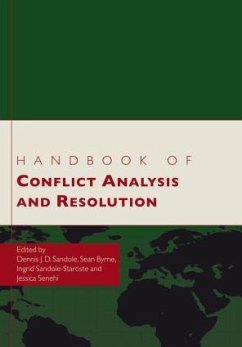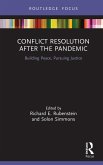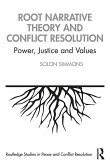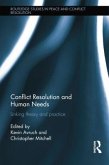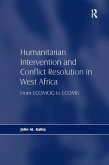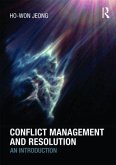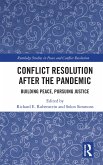Handbook of Conflict Analysis and Resolution
Herausgeber: Sandole, Dennis J. D.; Sandole-Staroste, Ingrid; Byrne, Sean
Handbook of Conflict Analysis and Resolution
Herausgeber: Sandole, Dennis J. D.; Sandole-Staroste, Ingrid; Byrne, Sean
- Broschiertes Buch
- Merkliste
- Auf die Merkliste
- Bewerten Bewerten
- Teilen
- Produkt teilen
- Produkterinnerung
- Produkterinnerung
A wide-ranging multidisciplinary mapping of the present state of the CR field.
This major Handbook is a collection of work from leading scholars in the Conflict Analysis and Resolution (CAR) field. The central theme is the value of interdisciplinary approaches to the analysis and resolution of conflicts.
Andere Kunden interessierten sich auch für
![Conflict Resolution after the Pandemic Conflict Resolution after the Pandemic]() Conflict Resolution after the Pandemic75,99 €
Conflict Resolution after the Pandemic75,99 €![Root Narrative Theory and Conflict Resolution Root Narrative Theory and Conflict Resolution]() Solon Simmons (USA George Mason University)Root Narrative Theory and Conflict Resolution59,99 €
Solon Simmons (USA George Mason University)Root Narrative Theory and Conflict Resolution59,99 €![The International Law of Peacebuilding The International Law of Peacebuilding]() Omar Grech (Malta University of Malta)The International Law of Peacebuilding71,99 €
Omar Grech (Malta University of Malta)The International Law of Peacebuilding71,99 €![Conflict Resolution and Human Needs Conflict Resolution and Human Needs]() Conflict Resolution and Human Needs80,99 €
Conflict Resolution and Human Needs80,99 €![Humanitarian Intervention and Conflict Resolution in West Africa Humanitarian Intervention and Conflict Resolution in West Africa]() John M. KabiaHumanitarian Intervention and Conflict Resolution in West Africa200,99 €
John M. KabiaHumanitarian Intervention and Conflict Resolution in West Africa200,99 €![Conflict Management and Resolution Conflict Management and Resolution]() Ho-Won JeongConflict Management and Resolution68,99 €
Ho-Won JeongConflict Management and Resolution68,99 €![Conflict Resolution after the Pandemic Conflict Resolution after the Pandemic]() Conflict Resolution after the Pandemic30,99 €
Conflict Resolution after the Pandemic30,99 €-
-
-
A wide-ranging multidisciplinary mapping of the present state of the CR field.
This major Handbook is a collection of work from leading scholars in the Conflict Analysis and Resolution (CAR) field. The central theme is the value of interdisciplinary approaches to the analysis and resolution of conflicts.
Hinweis: Dieser Artikel kann nur an eine deutsche Lieferadresse ausgeliefert werden.
This major Handbook is a collection of work from leading scholars in the Conflict Analysis and Resolution (CAR) field. The central theme is the value of interdisciplinary approaches to the analysis and resolution of conflicts.
Hinweis: Dieser Artikel kann nur an eine deutsche Lieferadresse ausgeliefert werden.
Produktdetails
- Produktdetails
- Verlag: Taylor & Francis Ltd
- Seitenzahl: 572
- Erscheinungstermin: 29. Oktober 2010
- Englisch
- Abmessung: 244mm x 170mm x 31mm
- Gewicht: 992g
- ISBN-13: 9780415577359
- ISBN-10: 0415577357
- Artikelnr.: 30621400
- Herstellerkennzeichnung
- Libri GmbH
- Europaallee 1
- 36244 Bad Hersfeld
- gpsr@libri.de
- Verlag: Taylor & Francis Ltd
- Seitenzahl: 572
- Erscheinungstermin: 29. Oktober 2010
- Englisch
- Abmessung: 244mm x 170mm x 31mm
- Gewicht: 992g
- ISBN-13: 9780415577359
- ISBN-10: 0415577357
- Artikelnr.: 30621400
- Herstellerkennzeichnung
- Libri GmbH
- Europaallee 1
- 36244 Bad Hersfeld
- gpsr@libri.de
Dennis J. D. Sandole is Professor of Conflict Resolution and International Relations at the Institute for Conflict Analysis and Resolution, George Mason University, USA. Sean Byrne is Professor of Peace and Conflict Studies and Founding Director of the Arthur V. Mauro Centre for Peace and Justice, St. Paul's College, University of Manitoba, Canada. Ingrid Sandole-Staroste is Adjunct Professor in the Department of Sociology, Global Affairs and Women's Studies Programs at George Mason University, USA. Jessica Senehi is Assistant Professor of Peace and Conflict Studies and Associate Director of the Arthur V. Mauro Centre for Peace and Justice, St. Paul's College, University of Manitoba, Canada.
Part 1: Core Concepts and Theories 1. The Role of Identity in Conflict 2.
Encountering Nationalism: The Contribution of Peace Studies and Conflict
Resolution 3. Gender Relations and Conflict Transformation Among Refugee
Women 4. Causation as a Core Concept in Conflict Analysis5. The Challenge
of Operationalizing Key Concepts in Conflict Resolution Theory in
International and Subnational Conflicts6. The Enemy and the Innocent of
Violent Conflicts7. Identity Conflicts: Models of Dynamics and Early
Warning 8. Generativity-Based Conflict: Maturing Micro Foundations for
Conflict Theory Part 2: Core Approaches: Conceptual and Methodological 9.
Human Agonistes: Interdisciplinary Inquiry into Ontological Agency and
Human Conflict 10. The Ethnography of Peace Education: Some Lessons Learned
from Palestinian-Jewish Integrated Education in Israel 11. Waging Conflicts
Constructively 12. A Social-Psychological Approach to Conflict Analysis and
Resolution 13. Building Relational Empathy Through An Interactive Design
Process 14. Building Peace: Storytelling to Transform Conflicts
Constructively 15. A Capacity Building Approach to Conflict Resolution16.
Gender Mainstreaming: A Valuable Tool in Building Sustainable Peace 17.
Culture Theory, Culture Clash, and the Practice of Conflict Resolution 18.
Conflict Resolution: The Missing Link between Liberal IR Theory and
Realistic Practice 19. Understanding the Development-Conflict Nexus and the
Contribution of Development Cooperation to Peacebuilding 20. Evaluation in
Conflict Resolution and Peacebuilding 21. Toward A Conflictology: The Quest
for Trans-Disciplinarity Part 3: Core Practices: Processes 22. Conflict
Transformation: Reasons to be Modest 23. Mediation Frames/Justice Games 24.
Interactive Conflict Resolution: Dialogue, Conflict Analysis and Problem
Solving25. Mediation and International Conflict Resolution: Analyzing
Structure and Behavior 26. Ethical and Gendered Dilemmas of Moving from
Emergency Response to Development in Failed States 27. Memory-Retrieval and
Truth-Recovery 28. Shifting from Coherent Towards Holistic Peace Processes
29. Law and Legal Processes in Resolving International Conflicts Part 4:
Alternative Voices and Complex Intervention Designs 30. Restorative
Processes of Peace and Healing within the Governing Structures of the
Rotinonshonni Longhouse People 31. Critical Systematic Inquiry in Conflict
Analysis and Resolution: An Essential Bridge between Theory and Practice
32. From Diagnosis to Treatment: Towards New Shared Principles for
Israeli/Palestinian Peacebuilding 33. Strategies for the Prevention,
Management and/or Resolution of (Ethnic) Crisis and Conflict: The Case of
the Balkans 34. The Perception of Economic Assistance in Northern Ireland
and Its Role in the Peace Process 35.Conflict Resolution in An Age of
Empire: New Challenges to an Emerging Field Conclusions Conclusion:
Revisiting the CAR Field Epilogue: Implications forTheory, Research,
Practice and Teaching
Encountering Nationalism: The Contribution of Peace Studies and Conflict
Resolution 3. Gender Relations and Conflict Transformation Among Refugee
Women 4. Causation as a Core Concept in Conflict Analysis5. The Challenge
of Operationalizing Key Concepts in Conflict Resolution Theory in
International and Subnational Conflicts6. The Enemy and the Innocent of
Violent Conflicts7. Identity Conflicts: Models of Dynamics and Early
Warning 8. Generativity-Based Conflict: Maturing Micro Foundations for
Conflict Theory Part 2: Core Approaches: Conceptual and Methodological 9.
Human Agonistes: Interdisciplinary Inquiry into Ontological Agency and
Human Conflict 10. The Ethnography of Peace Education: Some Lessons Learned
from Palestinian-Jewish Integrated Education in Israel 11. Waging Conflicts
Constructively 12. A Social-Psychological Approach to Conflict Analysis and
Resolution 13. Building Relational Empathy Through An Interactive Design
Process 14. Building Peace: Storytelling to Transform Conflicts
Constructively 15. A Capacity Building Approach to Conflict Resolution16.
Gender Mainstreaming: A Valuable Tool in Building Sustainable Peace 17.
Culture Theory, Culture Clash, and the Practice of Conflict Resolution 18.
Conflict Resolution: The Missing Link between Liberal IR Theory and
Realistic Practice 19. Understanding the Development-Conflict Nexus and the
Contribution of Development Cooperation to Peacebuilding 20. Evaluation in
Conflict Resolution and Peacebuilding 21. Toward A Conflictology: The Quest
for Trans-Disciplinarity Part 3: Core Practices: Processes 22. Conflict
Transformation: Reasons to be Modest 23. Mediation Frames/Justice Games 24.
Interactive Conflict Resolution: Dialogue, Conflict Analysis and Problem
Solving25. Mediation and International Conflict Resolution: Analyzing
Structure and Behavior 26. Ethical and Gendered Dilemmas of Moving from
Emergency Response to Development in Failed States 27. Memory-Retrieval and
Truth-Recovery 28. Shifting from Coherent Towards Holistic Peace Processes
29. Law and Legal Processes in Resolving International Conflicts Part 4:
Alternative Voices and Complex Intervention Designs 30. Restorative
Processes of Peace and Healing within the Governing Structures of the
Rotinonshonni Longhouse People 31. Critical Systematic Inquiry in Conflict
Analysis and Resolution: An Essential Bridge between Theory and Practice
32. From Diagnosis to Treatment: Towards New Shared Principles for
Israeli/Palestinian Peacebuilding 33. Strategies for the Prevention,
Management and/or Resolution of (Ethnic) Crisis and Conflict: The Case of
the Balkans 34. The Perception of Economic Assistance in Northern Ireland
and Its Role in the Peace Process 35.Conflict Resolution in An Age of
Empire: New Challenges to an Emerging Field Conclusions Conclusion:
Revisiting the CAR Field Epilogue: Implications forTheory, Research,
Practice and Teaching
Part 1: Core Concepts and Theories 1. The Role of Identity in Conflict 2.
Encountering Nationalism: The Contribution of Peace Studies and Conflict
Resolution 3. Gender Relations and Conflict Transformation Among Refugee
Women 4. Causation as a Core Concept in Conflict Analysis5. The Challenge
of Operationalizing Key Concepts in Conflict Resolution Theory in
International and Subnational Conflicts6. The Enemy and the Innocent of
Violent Conflicts7. Identity Conflicts: Models of Dynamics and Early
Warning 8. Generativity-Based Conflict: Maturing Micro Foundations for
Conflict Theory Part 2: Core Approaches: Conceptual and Methodological 9.
Human Agonistes: Interdisciplinary Inquiry into Ontological Agency and
Human Conflict 10. The Ethnography of Peace Education: Some Lessons Learned
from Palestinian-Jewish Integrated Education in Israel 11. Waging Conflicts
Constructively 12. A Social-Psychological Approach to Conflict Analysis and
Resolution 13. Building Relational Empathy Through An Interactive Design
Process 14. Building Peace: Storytelling to Transform Conflicts
Constructively 15. A Capacity Building Approach to Conflict Resolution16.
Gender Mainstreaming: A Valuable Tool in Building Sustainable Peace 17.
Culture Theory, Culture Clash, and the Practice of Conflict Resolution 18.
Conflict Resolution: The Missing Link between Liberal IR Theory and
Realistic Practice 19. Understanding the Development-Conflict Nexus and the
Contribution of Development Cooperation to Peacebuilding 20. Evaluation in
Conflict Resolution and Peacebuilding 21. Toward A Conflictology: The Quest
for Trans-Disciplinarity Part 3: Core Practices: Processes 22. Conflict
Transformation: Reasons to be Modest 23. Mediation Frames/Justice Games 24.
Interactive Conflict Resolution: Dialogue, Conflict Analysis and Problem
Solving25. Mediation and International Conflict Resolution: Analyzing
Structure and Behavior 26. Ethical and Gendered Dilemmas of Moving from
Emergency Response to Development in Failed States 27. Memory-Retrieval and
Truth-Recovery 28. Shifting from Coherent Towards Holistic Peace Processes
29. Law and Legal Processes in Resolving International Conflicts Part 4:
Alternative Voices and Complex Intervention Designs 30. Restorative
Processes of Peace and Healing within the Governing Structures of the
Rotinonshonni Longhouse People 31. Critical Systematic Inquiry in Conflict
Analysis and Resolution: An Essential Bridge between Theory and Practice
32. From Diagnosis to Treatment: Towards New Shared Principles for
Israeli/Palestinian Peacebuilding 33. Strategies for the Prevention,
Management and/or Resolution of (Ethnic) Crisis and Conflict: The Case of
the Balkans 34. The Perception of Economic Assistance in Northern Ireland
and Its Role in the Peace Process 35.Conflict Resolution in An Age of
Empire: New Challenges to an Emerging Field Conclusions Conclusion:
Revisiting the CAR Field Epilogue: Implications forTheory, Research,
Practice and Teaching
Encountering Nationalism: The Contribution of Peace Studies and Conflict
Resolution 3. Gender Relations and Conflict Transformation Among Refugee
Women 4. Causation as a Core Concept in Conflict Analysis5. The Challenge
of Operationalizing Key Concepts in Conflict Resolution Theory in
International and Subnational Conflicts6. The Enemy and the Innocent of
Violent Conflicts7. Identity Conflicts: Models of Dynamics and Early
Warning 8. Generativity-Based Conflict: Maturing Micro Foundations for
Conflict Theory Part 2: Core Approaches: Conceptual and Methodological 9.
Human Agonistes: Interdisciplinary Inquiry into Ontological Agency and
Human Conflict 10. The Ethnography of Peace Education: Some Lessons Learned
from Palestinian-Jewish Integrated Education in Israel 11. Waging Conflicts
Constructively 12. A Social-Psychological Approach to Conflict Analysis and
Resolution 13. Building Relational Empathy Through An Interactive Design
Process 14. Building Peace: Storytelling to Transform Conflicts
Constructively 15. A Capacity Building Approach to Conflict Resolution16.
Gender Mainstreaming: A Valuable Tool in Building Sustainable Peace 17.
Culture Theory, Culture Clash, and the Practice of Conflict Resolution 18.
Conflict Resolution: The Missing Link between Liberal IR Theory and
Realistic Practice 19. Understanding the Development-Conflict Nexus and the
Contribution of Development Cooperation to Peacebuilding 20. Evaluation in
Conflict Resolution and Peacebuilding 21. Toward A Conflictology: The Quest
for Trans-Disciplinarity Part 3: Core Practices: Processes 22. Conflict
Transformation: Reasons to be Modest 23. Mediation Frames/Justice Games 24.
Interactive Conflict Resolution: Dialogue, Conflict Analysis and Problem
Solving25. Mediation and International Conflict Resolution: Analyzing
Structure and Behavior 26. Ethical and Gendered Dilemmas of Moving from
Emergency Response to Development in Failed States 27. Memory-Retrieval and
Truth-Recovery 28. Shifting from Coherent Towards Holistic Peace Processes
29. Law and Legal Processes in Resolving International Conflicts Part 4:
Alternative Voices and Complex Intervention Designs 30. Restorative
Processes of Peace and Healing within the Governing Structures of the
Rotinonshonni Longhouse People 31. Critical Systematic Inquiry in Conflict
Analysis and Resolution: An Essential Bridge between Theory and Practice
32. From Diagnosis to Treatment: Towards New Shared Principles for
Israeli/Palestinian Peacebuilding 33. Strategies for the Prevention,
Management and/or Resolution of (Ethnic) Crisis and Conflict: The Case of
the Balkans 34. The Perception of Economic Assistance in Northern Ireland
and Its Role in the Peace Process 35.Conflict Resolution in An Age of
Empire: New Challenges to an Emerging Field Conclusions Conclusion:
Revisiting the CAR Field Epilogue: Implications forTheory, Research,
Practice and Teaching

